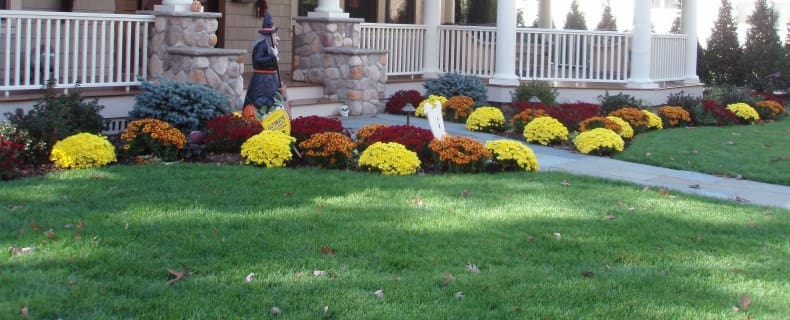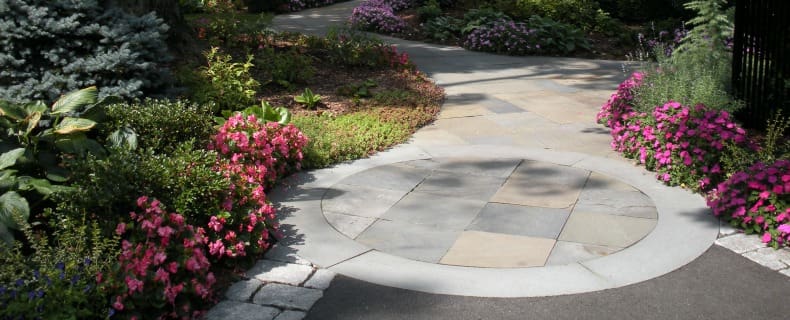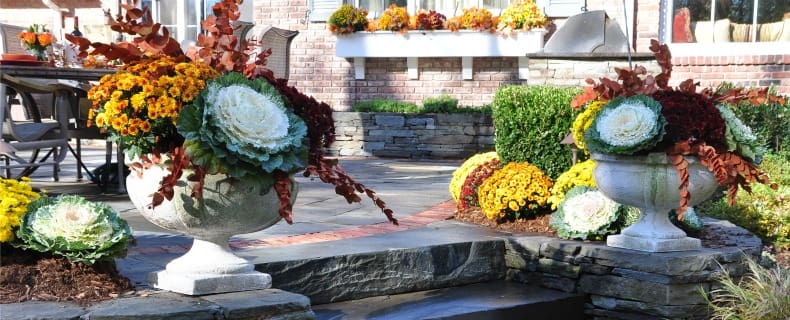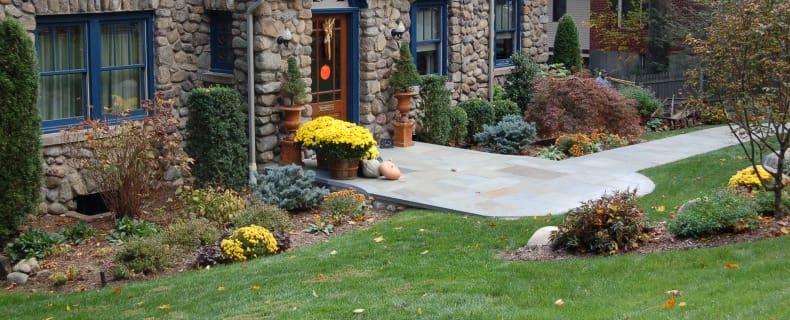As the fall season approaches, your Northern New Jersey landscape will begin to prepare for winter.
Your grass, plants, shrubs and trees will grow at a slower rate, then enter a dormant state as cold winter temperatures arrive.
To get your Bergen County landscape ready for the winter season, there are important things you need to do during the fall.
Without proper fall lawn care and landscape maintenance, your grass, plants, shrubs and trees may not survive the cold temperatures of winter.
To prepare your landscape for winter, take a look at 8 essential tips for fall landscaping New Jersey.

1. Keep a Well-Maintained Landscape
If you want a healthy, well-maintained landscape that will survive freezing Bergen County winter temperatures, provide regular care and maintenance during the fall.
An overgrown lawn will contribute to harmful insects that cause lawn diseases.
Overgrown foliage, shrubs and trees will invite unwanted outdoor pests. To prevent problems, make sure you mow your lawn, trim shrubs and trees, and keep a well-maintained landscape during the fall.
By hiring a professional Bergen County landscape company, like Borst Landscape & Design, you can ensure regular landscaping New Jersey services for your home.
Professional landscape crews will take care of your landscaping needs every week, so you don’t have to worry about problems.
Services include:
- Weekly lawn mowing
- Regular weeding
- Border edging for sidewalks, walkways and driveways
- Hardscape cleaning of walkways, driveways and patio areas
- Spring yard cleanup to remove dead winter growth and debris
- Fall yard cleanup to remove dead summer growth and prepare for winter
2. Use Organic Lawn Care Solutions
Organic lawn care will provide a safe, chemical-free environment for your home, family and pets.
By using natural, organic lawn care products, you can promote green living principles and protect the environment from harsh chemicals that are often found in many over-the-counter landscaping products like fertilizers, herbicides and pesticides.
Organic lawn care will help to establish a natural aeration and drainage system in your soil that promotes strong turf roots, healthy grass growth, weed control and prevention of lawn diseases and outdoor pests.
It will also help to establish a natural ecosystem in your landscape without harsh chemicals that can pollute the soil and water.
Organic landscaping New Jersey solutions will build a chemical-free outdoor environment that attracts beneficial insects and promotes healthy organisms like earth worms that help to establish rich, fertile soil and strong plants.
At times, certain landscape problems may still require more traditional treatments with non-organic materials, but Borst will apply chemical treatments only as needed to the affected areas.
At Borst, we advocate organic care for your lawn, shrubs and trees, rather than treatments with harsh chemicals.
Our organic applications are usually done in the fall, as well as spring and summer.

3. Fertilize Your Lawn and Plants
Although spring fertilization helps to jump start new growth for spring and summer, fall fertilization is essential for winter protection.
Fertilizing in early fall, will help your grass and plants store essential nutrients in their root systems, so they have enough food for winter when nutrients get depleted.
It takes a lot of energy to produce new green grass and plants in the spring. Most soils lack adequate nutrients to produce vital, healthy plant growth, so proper fertilization is essential to fall landscaping New Jersey.
Fall fertilization will promote healthy, stable roots and encourage new leaf growth.
It will also help your lawn and plants fight against environmental winter stresses like freezing ground temperatures, rainstorms, snowstorms and ice.
Cool-season grasses, most common in Bergen County landscapes, need a complete fertilizer with nitrogen, potassium, phosphorus and iron during the fall, as opposed to one that’s only high in nitrogen.
For best results, talk to a Bergen County landscape professional who’s knowledgeable about types of fertilizers, ingredients and applications.
A professional can choose the right fertilizer for your landscaping needs and set up proper fertilization schedules.
4. Fluff Up the Mulch
If you don’t have mulch in your landscape, it’s time to apply it. If you do, it’s time to fluff it up. Mulch provides important benefits for fall landscaping New Jersey.
Organic materials like cedar, hemlock and hardwood mulches provide excellent benefits for your flower beds, border plants and around shrubs and trees.
Mulch helps to:
- Retain moisture in the soil
- Maintain even soil temperatures
- Prevent soil erosion
- Reduce soil compaction
- Prevent weed growth
- Provide a neat, “finished” appearance
If you’re already using mulch, fall is an excellent time to fluff it up, or turn it over. Fluffing up the mulch will give your flowerbeds and border areas a fresh look.
If you need to add more fresh mulch, keep the pile around two or three inches deep.
Deep mulch piles, over four inches, prevent water from reaching plant roots effectively and become good hiding places for insects and outdoor pests.

5. Aerate Your Lawn
Fall season is a good time to aerate your lawn, so essential oxygen, water and nutrients can penetrate your soil.
During cold Bergen County winters, soil often hardens and becomes compacted from freezing temperatures, snow and ice.
Early fall lawn aeration will help grass and plant roots store important nutrients and survive through the winter months.
Lawn aeration reduces weeds. loosens the soil and improves drainage. There are two methods of lawn aeration: spike aerators that simply punch holes in the soil, and plug aerators that take plugs of soil out of the turf.
It’s best to use a plug aerator that will provide more efficient results. Spike aerators often don’t create large enough holes to allow for adequate air, water and fertilizer to reach turf roots.
Cool-season grasses, found most often in Northern NJ lawns, should be aerated in early fall. For best landscaping New Jersey results, contact a Bergen County landscape professional with proper lawn aeration knowledge and skill and the most efficient aeration equipment.
6. Over-Seed or Re-sod Your Lawn
In the fall, your lawn can benefit from over-seeding, even if it looks perfectly healthy.
Many types of turfgrass have a short lifespan of only a few years, so over-seeding in the fall will prevent your lawn from becoming thin and overrun with weeds.
Over-seeding will help parts of the lawn that are stressed from summer sun or trampled from too much summer foot traffic. The amount of seed you need depends on the condition of the lawn, but you typically need about three pounds of seed for every 1,000 square feet of lawn.
If you want to re-sod, or plant a new lawn, early fall is the best time to do it when Northern NJ temperatures are starting to cool down.
It’s important to over-seed or lay new sod before cold weather sets in. Cool-season grasses like fine and tall fescue, Kentucky bluegrass, perennial ryegrass and wheat grass germinate best when soil temperatures are between 50 and 65 degrees Fahrenheit.
With proper planting techniques and professional landscaping New Jersey preparation, fescue grasses will usually germinate within 14 days.

7. Do Some Planting and Pruning
Early fall is a great time to plant perennials and divide or re-space the ones already in your landscape. Plants don’t mind being handled, so be brave when dividing your perennials.
Just sink your shovel into the soil, loosen the dirt and lift out the plant. When you get the plant out of the ground, loosen the dirt around the root system, then carefully divide the plant.
Dividing perennials like hostas, daylilies, daisies and iris in the fall will help to control the plant’s size, revitalize the plant and create more plants in the spring.
If you have summer annuals, you can swap them out for fall-bloomers like mums and pansies.
Fall is also a great time to trim your shrubs and trees to prevent overgrowth in your landscape during the winter. It’s also important to remember to incorporate pruning into your lawn maintenance. For best landscaping New Jersey results, shrubs and trees should be pruned before cold weather arrives.
Some may need pruning to control their size, while others may need pruning to prevent damage from winter snow and ice storms, common in Northern New Jersey.
Talk to a landscape professional about the best time to prune your landscape plants, shrubs and trees, as specific varieties may dictate appropriate pruning times.
It’s best not to prune flowering plants like viburnum, hydrangeas and lilacs, as this could prevent spring blooms.
8. Prevent Weeds and Outdoor Pests
If weeds invaded your lawn during the summer, fall season is a good time to apply herbicides to eliminate them. Weeds, like most plants, are in energy-absorbing mode, rather than growth mode during the fall, so getting rid of them will be easier.
They are busy storing up moisture and nutrients and drinking in everything available, including weed killers. Applying an herbicide in the fall will eliminate existing weeds and keep them from popping up again in the spring.
Most herbicide manufacturers recommend applying weed killers in early or mid fall.
In the fall as temperatures begin to drop, insects, rodents and other outdoor pests begin looking for a warm winter habitat. Applying pesticides in the fall will help to prevent insects and outdoor pests from invading your landscape, and possibly your home.
Talk to a Bergen County landscape company, like Borst, about organic pesticide solutions and an Integrated Pest Management Program that provides year-round landscaping New Jersey solutions for pest control.
An Integrated Pest Management Program (IPM) focuses on safe, organic landscaping New Jersey pest control solutions that keep your lawn and landscape insect and pest free.
If you have existing insect and pest problems, a knowledgeable, experienced landscape professional can identify the pests and offer the right pest control solutions to clear up the problems.
An Integrated Pest Management Program provides:
- A property visit from an IPM specialist during the season to evaluate your lawn and landscape health.
- An inspection by an IPM specialist of your lawn, shrubs and trees at each visit, followed up by recommended treatments for insect and pest problems found.
- A detailed report after each inspection that outlines any pest problems found and how those problems were treated.

